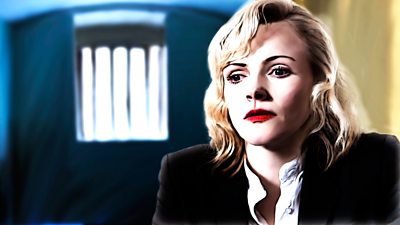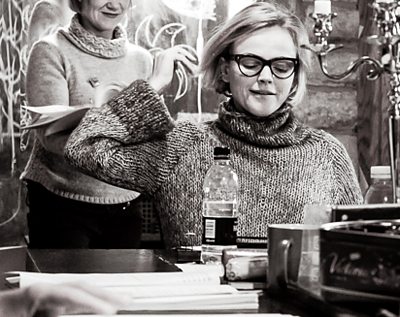The Thrill of Love by Amanda Whittington is about the life of Ruth Ellis, the last woman to be hanged in Britain. The radio adaptation, starring Maxine Peake is broadcast on BBC Radio 4 on Saturday 5th November 2016 at 2.30pm and available on BBC iPlayer until 4th December 2016. We caught up with Amanda to ask her to compare writing for theatre and radio and how stage scripts change when they move onto radio.
The Guardian recently highlighted you are the most performed female playwright in the UK. Why do you think that is?
Stamina, mainly! I started writing for a living when I left school, so I’ve had nearly 30 years to learn my craft. I wasn’t an overnight success as a playwright which served me well in the long term. It gave me time to find my voice and what I most wanted to say.
I didn’t get too embroiled in the London new writing culture either and came up instead through regional theatre, which values work with a popular tone. Writing for Hull Truck, West Yorkshire Playhouse, Nottingham Playhouse and the New Vic – who commissioned the original stage version of The Thrill of Love - taught me how to connect with a mainstream audience which has given my plays a wider resonance. I’m ambivalent about the phrase ‘female playwright’ but I do think the fact that most of my plays put working-class women centre-stage is a big part of their popularity, too.
Why do radio dramas often come from stage plays? What kind of a theatre script can work well on radio?
I think perhaps it’s because theatre is character-led and translates more easily to radio than the plot-driven drama of film and TV. Radio can be intimate and epic: plays which delicately explore character and relationships work well but so do the big social, political and moral stories of our times when they’re told through the prism of people’s lives. At their heart, great stage plays also contain a poetic metaphor which can reveal itself to great effect on radio. I think because it works so directly on the imagination and isn’t constrained by the physical boundaries of the stage, radio can heighten that poetry and reveal its deeper truth.
Have you ever started a play for radio and turned it into a stage play?
I wrote The Dock, Nuremberg, a Writing the Century serial based on the diaries of the artist Laura Knight. In 1946, Laura was sent by the War Office to make a painting of the Nuremberg Trials which became one of her greatest works. I kept researching her life once I’d finished the serial and found a wealth of stories within it. When I was commissioned by Central to write a play for a group of 16 MA Acting students, I thought this was an opportunity to broaden and expand on the radio play. I introduced the students to Laura Knight by playing the radio drama. A year-long script development process became Miss Johnson, a play about Laura’s life in art. It was a joy to do and it’s a play I’d like to return to at some point but it began with a radio commission to find a real-life diary to adapt.

Talk though the process of adapting / abridging your stage plays to radio
The process begins with practical decisions, most of which are informed by the format. In simple terms, writing a play for a 5 x 15 minutes serial calls for a different approach than a stage play with two 50 minutes acts and an interval. For Bollywood Jane, I replotted the original script over five episodes, with each having its own self-contained story arc. For The Thrill of Love, I wanted to revisit the play’s structure and style in the more compact form of a one-hour drama.
I never set out to pick apart or dismantle the plays I’ve adapted. I try to resist losing characters or significant storylines but equally, you have to meet the challenge of telling your story in a new medium and a different way.
So once those choices are made, I go back to the existing text: cutting and pasting to begin with (though mainly cutting!), adding new dialogue and scenes to smooth out the cuts, then reworking the original material in the light of what’s new. Scenes generally become shorter and I always keep an eye on word count, which for me is the best indicator of a script’s length. Writing to the minute is very different to writing for the fluid time scale of the stage. Over numerous drafts, the text begins to take on its own identity. Most importantly, I strive for discoveries which are quintessentially ‘radio’ and work towards a new script which is wholly reimagined for the medium.
Any Do’s and Don’ts tips for writers wanting to rethink theatre ideas or plays for radio?
Do think about the possibility of creating a character who can speak directly to the listener. If that’s right for your story, it can be a direct and powerful way to engage an audience and draw them into your character’s inner life. Don’t build your ideas on the potential for ‘sound effects’. People tune into radio drama for exactly the same reason they go to the theatre, read a book or watch a film: for a great story, well-told. Sound is not the same as atmosphere or setting, and everything the audience hears has to drive your story and characters forward.
With Thrill of Love why did you feel it would work well on radio and did it match expectations?
Yes, it surpassed my expectations. I’d worked with the director Kate Chapman on various radio and theatre projects, so when she suggested the idea of Thrill on the radio, I was keen to do it but wasn’t quite sure how it’d work. The play has a complex structure: it moves around in time, blending fact, fiction, imagination and the mythology of Ruth Ellis to give a new understanding of her case. But I think all that was what inspired Kate to make it. We had a trust and understanding which enabled us to hit the ground running on the script-work.
Kate is very experienced in script development, so I was well-supported. She also had her own vision of what radio drama could bring to the story, which was exciting for me. We set out to explore the territory between what the script was and what it could become. I feel we found something new without losing the vital elements.

What’s changed and what’s stayed the same?
The play has an expressionistic seam running through it, which seeks to draw out Ruth’s unspoken and misunderstood feelings, thoughts and experiences. This weaves its way around realistic scenes between Ruth and her workmates, which explore the everyday world of the nightclub hostesses. The interplay between Ruth’s internal and external world is there in the stage and the radio versions but on radio, it has a heightened intensity. The fluidity of the format suits the style of the play and enables us to go more deeply into Ruth’s psyche. There’s a dark energy and atmosphere, and because we’re telling the story in an hour (and without the obligatory theatre interval) the tension rises to boiling point. I wanted to create the sense that Ruth’s life was like a runaway train and I think the radio adaptation finds that brilliantly.
Ruth Ellis has been covered in documentary and drama before. What do you have to bear in mind when dealing with real life and how did you make the Thrill of Love fresh for audiences?
Ruth’s statement on the night of the murder begins: ‘I am guilty. I am rather confused’. For me, these seven words are loaded with meaning and subtext.
I think in a well-known case like this you need to read between the lines and search for new truths within. The fact is that Ruth Ellis was executed in 1955 for shooting her lover David Blakely in a Hampstead street. Drama and documentary have largely portrayed it as a crime of passion. There’s always been sympathy for Ruth, who was beaten by Blakely but refused to present herself as a victim. I wanted to go beyond historical record, and look at Ruth’s life in the light of what we now know of her – and of the consequences of sexual abuse, exploitation and domestic violence on women. Given her experiences, it’s unlikely a psychiatrist would now say (as they did in 1955) her crime was ‘a sign of emotional immaturity’. The sense of detachment showed after her arrest was more likely to be post-traumatic stress than the ‘equanimity’ her doctor recorded.
I was interested not so much in what Ruth did but why she did it. This led me away from the ‘doomed love affair’ scenario and into her life as a hostess in the West End gentlemen’s clubs. Here, Ruth was one of a countless number of young working-class women who sought more from life than a factory job, marriage and motherhood. I was intrigued by the private world of those women. Who were they when the clubs closed; what were their dreams and desires, and what had they actually found? Their voices were all but silent in the official record of Ruth’s story but I felt it was time we heard them. I began to reimagine the facts of the case through their eyes and experiences, and in doing so, a new story came to life.

In theatre you have a captive audience whilst on radio your audience is often doing something else and could more easily switch off or over. Does that change how you approach the openings?
Yes, definitely. One of the blessings of theatre is that (hopefully) you have the audience in their seats for at least the first half of the play. On radio, you can lose them in an instant. That’s why character and story is essential from the first moment; you can’t spend 15 minutes setting a scene, you have to engage the listener emotionally and intellectually right from the start. That changes how you approach every moment of the script, to be honest. As a writer, you can’t let the energy drop at all, and to convey the complexities of a relationship or situation, you need to craft dialogue that’s razor sharp and clear. But that’s what I love about writing for radio. All you have are the words but the words are everything.
The Thrill of Love by Amanda Whittington @AmandaPlays is broadcast on BBC Radio 4 on Saturday 5th November 2016 at 2.30pm and available on BBC iPlayer until 4th December 2016.
It is directed by Kate Chapman @K7Kate and produced by Justine Potter @SavvyJustine. Justine also runs BBC Writersroom North based at Salford's Media City.
